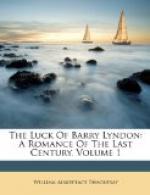I had no doubts of the future: thinking that a man of my person, parts, and courage, could make his way anywhere. Besides, I had twenty gold guineas in my pocket; a sum which (although I was mistaken) I calculated would last me for four months at least, during which time something would be done towards the making of my fortune. So I rode on, singing to myself, or chatting with the passers-by; and all the girls along the road said God save me for a clever gentleman! As for Nora and Castle Brady, between to-day and yesterday there seemed to be a gap as of half-a-score of years. I vowed I would never re-enter the place but as a great man; and I kept my vow too, as you shall hear in due time.
There was much more liveliness and bustle on the king’s highroad in those times, than in these days of stage-coaches, which carry you from one end of the kingdom to another in a few score hours. The gentry rode their own horses or drove in their own coaches, and spent three days on a journey which now occupies ten hours; so that there was no lack of company for a person travelling towards Dublin. I made part of the journey from Carlow towards Naas with a well-armed gentleman from Kilkenny, dressed in green and a gold cord, with a patch on his eye, and riding a powerful mare. He asked me the question of the day, and whither I was bound, and whether my mother was not afraid on account of the highwaymen to let one so young as myself to travel? But I said, pulling out one of them from a holster, that I had a pair of good pistols that had already done execution, and were ready to do it again; and here, a pock-marked man coming up, he put spurs into his bay mare and left me. She was a much more powerful animal than mine; and, besides, I did not wish to fatigue my horse, wishing to enter Dublin that night, and in reputable condition.
As I rode towards Kilcullen, I saw a crowd of the peasant-people assembled round a one-horse chair, and my friend in green, as I thought, making off half a mile up the hill. A footman was howling ‘Stop thief!’ at the top of his voice; but the country fellows were only laughing at his distress, and making all sorts of jokes at the adventure which had just befallen.
‘Sure you might have kept him off with your blunderBUSH!’ says one fellow.
‘Oh, the coward! to let the Captain Bate you; and he only one eye!’ cries another.
‘The next time my Lady travels, she’d better lave you at home!’ said a third.
‘What is this noise, fellows?’ said I, riding up amongst them, and, seeing a lady in the carriage very pale and frightened, gave a slash of my whip, and bade the red-shanked ruffians keep off. ’What has happened, madam, to annoy your Ladyship?’ I said, pulling off my hat, and bringing my mare up in a prance to the chair window.
The lady explained. She was the wife of Captain Fitzsimons, and was hastening to join the Captain at Dublin. Her chair had been stopped by a highway-man: the great oaf of a servant-man had fallen down on his knees armed as he was; and though there were thirty people in the next field working when the ruffian attacked her, not one of them would help her; but, on the contrary, wished the Captain, as they called the highwayman, good luck.




